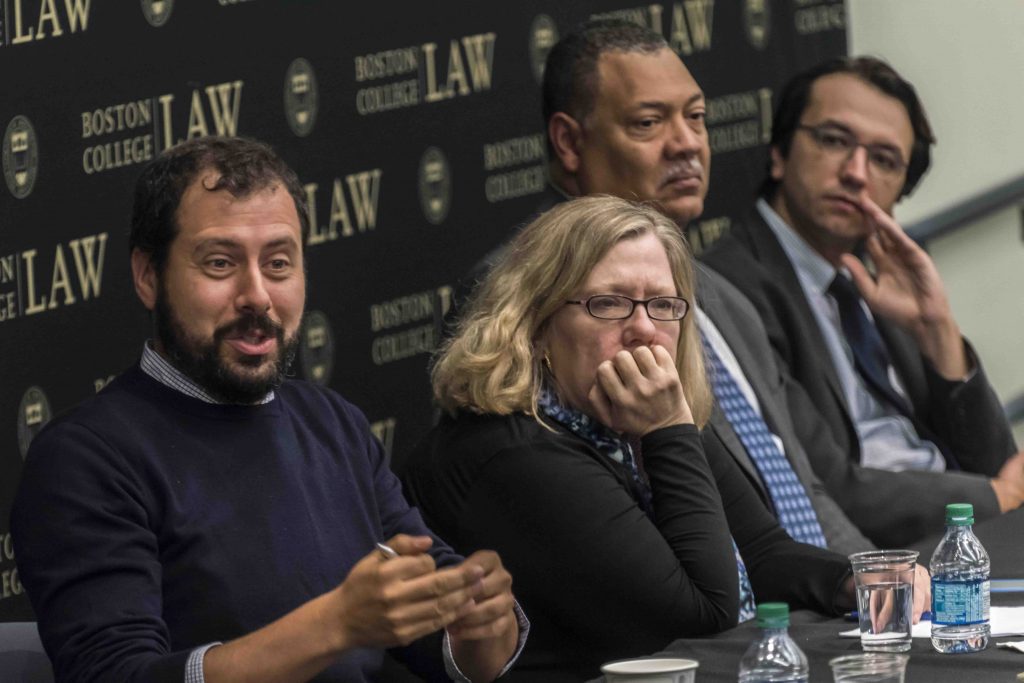“The values on which constitutional democracy rest have been profoundly shaken by the events in Charlottesville,” said Vlad Perju, director of the Clough Center for the Study of Constitutional Democracy, in his introduction to a panel discussion October 4 entitled “After Charlottesville.”
Perju also emphasized the importance of explicitly opposing violence, bigotry, and racism. It was in that spirit that members of the BC community gathered to address the issues raised by recent events in Charlottesville and what they reveal about the current state of democratic values, freedoms, and practices in the United States, as well as to identify ways forward. The panelists were BC Law Dean Vincent Rougeau and professors Cathleen Kaveny and Daniel Farbman.
Dean Rougeau spoke first of political polarization, describing as a crisis the “increasing inability to speak to each other around difficult issues.”
Concerning Charlottesville, he asked whether neo-Nazis simply express “another opinion,” or whether they “represent something which is so anathema to our democratic values, so truly toxic to our common life, that it requires a special kind of response.”
Rougeau further questioned whether the US ought to be willing to tolerate ongoing veneration of the Confederacy. Racism and slavery are “realities of the past that need to be talked about in a meaningful way,” he said, but the public monuments in question sanitize the past and falsely suggest that the majority of citizens in these cities “acquiesce in their presence.”
From her position as both lawyer and theologian, Professor Kaveny explored the distinction in Christian tradition between idols and icons. She said tradition implies that two questions should be asked about an image in order to tell the difference: “Does it tell the truth?” and “Does it work for the good, particularly the good of the most vulnerable?”
Kaveny suggested that this idea may serve as a resource for the evaluation of American public images. For example, the Lincoln Memorial can be thought of as an icon. It tells the truth by acknowledging the reality of slavery while simultaneously highlighting reunion and redemption and encouraging work towards the equal dignity of all Americans. On the other hand, she argued, statues of Robert E. Lee function as idols. They fail to tell the truth about his character and the cause for which he stood, and were intended to work for the perpetuation of Jim Crow laws.
Professor Farbman expressed dissatisfaction with the notion that “we once knew how to disagree civilly and we don’t anymore.” While earlier political times may have felt more settled, he said, “we should be skeptical about the settlement of that political discourse,” because it has often rested on the exclusion of those who present foundational challenges.
Previous moments of unrest, although difficult, have been ruptures leading to greater inclusion, Farbman said, adding that the danger of “civility” is that it can be used to suppress uncomfortable activism—as seen in objections to recent protests in the NFL. Change comes about through democratic participation, he said, but the ultimate goal of such engagement is not civility but justice.
In the conversation with the audience that followed, two major themes emerged.
First was the BC community’s own use of images, such as the Law School’s display of predominantly white male portraits. Rougeau, while noting the complexities of such a discussion, acknowledged that “it is well past time for our hallways to reflect the community we are today.”
Second was the relation of civility to political action. The panel considered whether civility could be equated with politeness and discussed the way in which Martin Luther King Jr.’s nonviolence was designed precisely to expose latent cultural violence. Rougeau warned against the loss of the memory of the suffering endured by those who engaged in such nonviolent resistance. We must ask ourselves, he said, “What are we willing to give up…to demonstrate that we are actually serious about what we believe in?”
The discussion as a whole was an encouraging example of respectful democratic conversation. It also represented a challenge, however, to further reflect on the implications of our personal and communal commitment to democratic ideals after Charlottesville and beyond.
Photo, from left, Daniel Farbman, Kathleen Caveny, Dean Vincent Rougeau, Vlad Perju.


